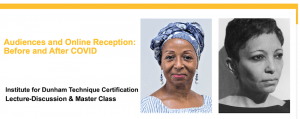This roundtable by Ohio State University Professors Harmony Bench (Associate Professor, Department of Dance), Yana Hashamova (Professor and Chair of the Department of Slavic and East European Languages and Cultures), Hannah Kosstrin (Associate Professor, Department of Dance), and Danielle Schoon (Senior Lecturer, Department of Near Eastern Languages and Cultures), comes at the conclusion of their 2020-21 project Audiences and Online Reception: Before and After COVID, funded by a Global Arts and Humanities Discovery Theme Special Grants Initiative.
Audiences and Online Reception: Before and After COVID examines the impact of COVID-19 and quarantine experiences on artistic and cultural production by examining historical precedents, considering audiences in their social contexts, and imagining possible futures based on how audiences are currently forming. This project asks: How does COVID-19 impact cultural production, reception, and circulation? How are artists and scholars evolving their creative practices and research methods in response to quarantine experiences? What engagement strategies are cultural institutions pursuing to develop new audiences as their venues shutter? How are online and offline audiences responding to changes wrought by COVID-19? In what ways do audiences participate in creating meaning and social narratives, particularly during unstable political climates past and present?

